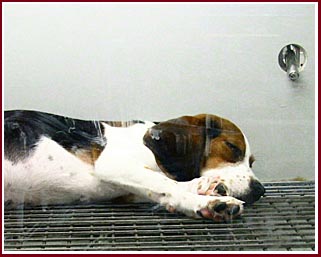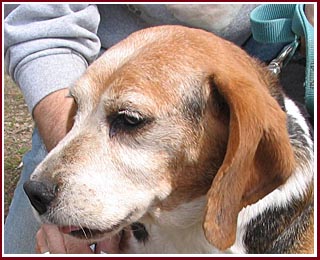|
|
|
|
|
|
ACTION ALERT: TELL COMMITTEE MEMBERS
YES TO SB 414/AB 436, THE WISCONSIN BEAGLE FREEDOM BILL AS ORIGINALLY
WRITTEN,
EMPHATIC NO TO SENATE/ASSEMBLY AMENDMENT 1!
Updated 1/9/26
|
|
|
|
| |
| NOTE: On
November 4, 2025, an amendment was added to SB 414/AB 436 that would strip out
all of the protections for former laboratory dogs that the bill was originally
written to ensure! IF THE BILL PASSES OUT OF COMMITTEE WITH THIS AMENDMENT
INCLUDED, WE CANNOT, IN ALL GOOD CONSCIENCE, CONTINUE TO SUPPORT
IT.
Senate/Assembly
1 would, essentially, put disposition of the dogs entirely in the hands of the
lab, with NO recordkeeping accountability to either regulatory agencies within
the state or to the public. You will find information on both the bill as
written and the amendment below, along with our comments.
 Read Senate Amendment 1 here Read Senate Amendment 1 here 
 Senate/Assembly Amendment 1 Summary Senate/Assembly Amendment 1 Summary 
|
|
| |
 Original Bill Text Original Bill Text  Bill History Bill History  Original Bill
Summary Original Bill
Summary 
 Senate/Assembly Amendment 1 Summary Senate/Assembly Amendment 1 Summary  Senate/Assembly Amendment 1 Senate/Assembly Amendment 1 
 TAKE
ACTION TAKE
ACTION  Talking
Points Talking
Points 
 What To Expect At A Public Hearing What To Expect At A Public Hearing  Find your WI State
Representatives Find your WI State
Representatives 
 How a Bill Becomes a Law in Wisconsin How a Bill Becomes a Law in Wisconsin 
|
| |
|
 The bipartisan Beagle Freedom Bill,
SB 414, relating to: requiring animal testing facilities and breeders to offer
certain dogs and cats for adoption to releasing agencies and providing a
penalty, was introduced into the WI State Senate on Sept. 4, 2025 by Senators
Wanggaard, Carpenter, Habush Sinykin, Ratcliff, Spreitzer, Keyeski and Jagler,
and cosponsored by Representatives Kitchens, Joers, Armstrong, Udell, Miresse,
DeSmidt, Piwowarczyk, Maxey, Palmeri, Kreibich, Bare, Goodwin, Donovan,
Sheehan, Anderson, Sinicki, Behnke, Melotik, Mursau and Stubbs. It was referred
to the
Senate Committee on Government Operations, Labor and Economic
Development.. The bipartisan Beagle Freedom Bill,
SB 414, relating to: requiring animal testing facilities and breeders to offer
certain dogs and cats for adoption to releasing agencies and providing a
penalty, was introduced into the WI State Senate on Sept. 4, 2025 by Senators
Wanggaard, Carpenter, Habush Sinykin, Ratcliff, Spreitzer, Keyeski and Jagler,
and cosponsored by Representatives Kitchens, Joers, Armstrong, Udell, Miresse,
DeSmidt, Piwowarczyk, Maxey, Palmeri, Kreibich, Bare, Goodwin, Donovan,
Sheehan, Anderson, Sinicki, Behnke, Melotik, Mursau and Stubbs. It was referred
to the
Senate Committee on Government Operations, Labor and Economic
Development..
On
September 19, 2025, the companion bill, AB 436, was Introduced into the
Assembly by Representatives Kitchens, Joers, Armstrong, Udell, Miresse,
DeSmidt, Piwowarczyk, Maxey, Palmeri, Kreibich, Bare, Goodwin, Donovan,
Sheehan, Anderson, Sinicki, Behnke, Melotik, Mursau and Stubbs; and cosponsored
by Senators Wanggaard, Carpenter, Habush Sinykin, Ratcliff, Spreitzer, Keyeski
and Jagler. It was referred to the Assembly
Committee on State Affairs.
The bill as written has a
truly bipartisan group of co-sponsors, and another, Rep. Billings, was added on
November 4, 2025, and Representative Steffen, on November 19. On January 8,
2026, Representative J. Jacobson joined the co-sponsor list.
From the Co-Sponsorship Memorandum
on the original bill:
Animals subjected to animal
testing and research deserve a fair shot at a new beginning. Often these
animals have never had a real home, a loving family, or a chance to run outside
in fresh grass.
Under
current state and federal law, there is no statutory requirement for research
organizations and animal testing facilities to observe an adoption period and
make an active effort to find a family or adoption agency that will take in
these dogs and cats.
More
than 15 states have passed laws requiring animal testing facilities to allow
dogs to be adopted including our neighboring states of Minnesota, Iowa,
Illinois, and Michigan.
This
bill would require research and testing institutions to hold a mandatory
three-week adoption period where dogs and cats are able to be transferred to
adoption agencies or directly adopted. Institutions that do not comply with the
required adoption period will be subject to a fine no higher than $5,000.
This sounds like a no-brainer to us, but opposition from
some of the facilities that would be affected was been immediate and vocal.
SENATE/ASSEMBLY
AMENDMENT 1:
On
November 4, 2025, Senate Amendment 1 and Assembly Amendment 1 were proposed,
according to a staffer for Sen. Wanggaard, after his office had been working
with several research facilities on this bill -- no surprise that these
facilities were opposed to it as written. This new amendment would:
Add that the welfare of the animal
will be considered when determining whether an animal is suitable for
adoption. That should go without saying, since this is the entire
purpose of the law.
Clarifies that the professional
judgment of the research veterinarian will be used to determine whether an
animal is suitable for adoption, based on the welfare of the animal.
Certainly the input of the research veterinarian should be taken into
consideration, but it seems to us that giving him/her the final say would be
like putting the fox in charge of all of the henhouses.
Allows private adoptions for
research facilities and breeders. Oh, hell, no!
"Private adoptions" very likely equals SALE. NO ethical breeder would
take a dog from a "research facility" for breeding -- so, this
provision is essentially advocating release/sale of the dogs to puppy millers.
And -- "private adoptions to research facilities?" Instead of being
allowed to live the rest of their lives in freedom, the lab dogs could
potentially go right back into a hell hole like Ridglan Farms!
Requires facilities to retain
their own records for 12 months, available at DATCP’s request, and
exempt from public records. Absolutely NOT! This in itself
should be a total non-starter, a totally unacceptable precedent that would
remove ALL transparency. The labs could be back to doing whatever they wish
with the dogs, with no way for the public or regulating agencies to police
them.
Removes the penalty for
recordkeeping requirements. With exemption from public records and NO
penalty for not keeping the required records, the animals would be in a worse
position than they are at present!
The
amendment undermines the intent of the bill by handing control over adoptions
entirely to the animal research institutions. It allows them to decide whether
animals used in experiments are ever made available for adoption, shields their
records from public oversight by exempting them from open-records laws, and
eliminates penalties for failing to maintain or produce adoption records.
 Read Senate Amendment 1 here Read Senate Amendment 1 here  Find your WI State
Representatives Find your WI State
Representatives 
|
| |
Top
|
| |
Original Bill Summary (by the
Legislative Reference Bureau):
 "This bill requires animal
testing facilities and persons that breed cats or dogs for sale or transfer to
an animal testing facility to offer to a releasing agency for eventual adoption
certain dogs and cats that do not pose a risk to public health. A
“releasing agency” is defined to mean an animal shelter, humane
society, animal welfare organization, society for the prevention of cruelty to
animals, home-based rescue, or other entity that provides individuals with
animals for adoption as companion animals. The bill requires that, if an animal
testing facility is operated by a state agency or an institution of higher
education, the state agency or institution of higher education may develop its
own internal adoption program to effectuate the requirements of the bill. "This bill requires animal
testing facilities and persons that breed cats or dogs for sale or transfer to
an animal testing facility to offer to a releasing agency for eventual adoption
certain dogs and cats that do not pose a risk to public health. A
“releasing agency” is defined to mean an animal shelter, humane
society, animal welfare organization, society for the prevention of cruelty to
animals, home-based rescue, or other entity that provides individuals with
animals for adoption as companion animals. The bill requires that, if an animal
testing facility is operated by a state agency or an institution of higher
education, the state agency or institution of higher education may develop its
own internal adoption program to effectuate the requirements of the bill.
"The bill also requires
animal testing facilities and breeders to annually report to the Department of
Agriculture, Trade and Consumer Protection certain information about the dogs
and cats that they offer to transfer to releasing agency.
"A person who violates the
provisions of the bill shall be subject to a forfeiture not to exceed
$5,000."
PLEASE NOTE: Senate/Assembly
Amendment 1 (see above) would totally eliminate all
reporting requirements AND put the disposition of the dogs entirely back in the
hands of the research facilities. In effect, the amendment would be a giant
step BACKWARD for lab animals.
|
| |
Top
|
| |
WHAT YOU CAN DO:
 General guidelines for contacting
your representatives: Try to keep your message brief, and be sure to give your name, complete mailing address, and phone
number. Let your representative know that you are a constituent.
Please, ALWAYS be polite and respectful. Name-calling, and rude or abusive
letters or emails will hurt, rather than help, our cause. General guidelines for contacting
your representatives: Try to keep your message brief, and be sure to give your name, complete mailing address, and phone
number. Let your representative know that you are a constituent.
Please, ALWAYS be polite and respectful. Name-calling, and rude or abusive
letters or emails will hurt, rather than help, our cause.
PLEASE Contact ALL members of the
Senate Committee on Government Operations, Labor and Economic
Development. and the
Assembly Committee on State Affairs and ask them to SUPPORT
SB 414/AB 436, the WI Beagle Freedom Bill, WITHOUT AMENDMENT, requiring animal
testing facilities and breeders to offer dogs and cats for adoption to
releasing agencies! Also ask them to OPPOSE Senate/Assembly Amendment
1. Please note: If you are a constituent of any of these Committee
members, let them know that. It is also a good idea to email the Committee
Clerk.
Put "YES to SB 414/AB 436,
the WI Beagle Freedom Bill, UNAMENDED and NO to Amendment 1" in the
Subject line.
All you need to say in the email
is: Dear [ ], I am writing to ask you please to SUPPORT SB 414/AB 436, the WI
Beagle Freedom Bill UNAMENDED, requiring animal testing facilities and breeders
to offer dogs and cats for adoption to releasing agencies. I believe that
animals who have been subjected to animal testing and research should finally
discover what it is to be a dog, in a loving Forever home. Also, please OPPOSE
Senate/Assembly Amendment 1, which would strip out reporting requirements and
put the disposition of the animals soley in the hands of the
laboratories."
If you want to give reasons for
your position, please see our Talking Points
below!
Again, it is VERY important that
you include your full name, street address, city, state
and zip. Phone number and email address are also helpful.
 Find your WI State
Representatives Find your WI State
Representatives 
|
| |
Top
|
| |
TALKING POINTS:
 Animals subjected to animal testing and
research deserve a fair shot at a new beginning. Often these animals have never
had a real home, a loving family, or a chance to run outside in fresh grass. Animals subjected to animal testing and
research deserve a fair shot at a new beginning. Often these animals have never
had a real home, a loving family, or a chance to run outside in fresh grass.
Under
current Wisconsin law, there are no requirements for research organizations and
animal testing facilities to make an active effort to find a family or adoption
agency that will take in these dogs and cats. HOWEVER, More than 15 states have
passed laws requiring animal testing facilities to allow dogs to be adopted
including our neighboring states of Minnesota, Iowa, Illinois, and Michigan.
SB
414/AB 436 as originally written would require research and testing
institutions to hold a mandatory three-week adoption period where dogs and cats
are able to be transferred to adoption agencies or directly adopted.
Institutions that do not comply with the required adoption period will be
subject to upto $5,000 in fines.
As defined by the bill,
“Releasing agency” means an animal shelter, humane society, animal
welfare organization, society for the prevention of cruelty to animals,
home-based rescue, or other nonprofit group that provides individuals with
animals for adoption as companion animals. The Wisconsin humane community, with
its decades of experience, is ready, willing, and able to help test subject
animals move from laboratory life to caring homes.
If an animal testing facility is
operated by a state agency or an institution of higher education, that facility
may develop its own internal adoption program.
Also included in the bill are strict record-keeping
requirements for the animal testing facilities, to be submitted annualy,
detailing: a) The total number of dogs and cats it owned. (b) The total number
of dogs and cats it used for research or testing. (c) The total number of dogs
and cats it transferred to a releasing agency for the purpose of adoption. (d)
The name and address of each releasing agency to which it transferred a dog or
cat for the purpose of adoption. (e) The total number of dogs and cats that
were adopted from its internal adoption program, if applicable.
Federal agencies are already
moving away from animal testing. As the nation shifts toward modern, humane
research, it is inconsistent and indefensible to deny animals who have already
suffered the chance to live out their remaining years in peace.
The Wisconsin humane community
is united in its support of the original Beagle Freedom Bill. They are ready,
willing, and able to help test subject animals move from laboratory life to
caring homes.
Senate
Amendment 1 and Assembly Amendment 1 were proposed, according to a staffer
for Sen. Wanggaard, after his office had been working with several research
facilities on this bill -- no surprise that these facilities were opposed to it
as written. This new amendment would:
-
Clarify that the professional
judgment of the research veterinarian will be used to determine whether an
animal is suitable for adoption, based on the welfare of the animal.
Certainly the input of the research veterinarian should be taken into
consideration, but it seems to us that giving him/her the final say would be
like putting the fox in charge of all of the henhouses.
Allow private adoptions for
research facilities and breeders. Oh, hell, no!
"Private adoptions" very likely equals SALE. NO ethical breeder would
take a dog from a "research facility" for breeding -- so, this
provision is essentially advocating release/sale of the dogs to puppy millers.
And -- "private adoptions to research facilities?" Instead of being
allowed to live the rest of their lives in freedom, the lab dogs could
potentially go right back into a hell hole like Ridglan Farms!
Requires facilities to retain
their own records for 12 months, available at DATCP’s request, and
exempt from public records. Absolutely NOT! This in itself
should be a total non-starter, a totally unacceptable precedent that would
remove ALL transparency. The labs could be back to doing whatever they wish
with the dogs, with no way for the public or regulating agencies to police
them.
. Removes the penalty for
recordkeeping requirements. With exemption from public records and NO
penalty for not keeping the required records, the animals would be in a worse
position than they are at present!
The
amendment undermines the intent of the bill by handing control over adoptions
entirely to the animal research institutions. It allows them to decide whether
animals used in experiments are ever made available for adoption, shields their
records from public oversight by exempting them from open-records laws, and
eliminates penalties for failing to maintain or produce adoption records.
Watering down the e original
bill with the proposed contradictory amendments will likely result in none of
the test subject dogs or cats ever being free to enjoy "life after the
lab." These animals deserve to feel sunshine instead of lab lights, grass
and soft beds instead of wire cages, and the touch of compassionate hands in
loving homes at last.

 Original Bill Text Original Bill Text  Bill History Bill History  Original Bill
Summary Original Bill
Summary 
 Senate/Assembly Amendment 1 Summary Senate/Assembly Amendment 1 Summary  Senate/Assembly Amendment 1 Senate/Assembly Amendment 1 
 TAKE
ACTION TAKE
ACTION  Talking
Points Talking
Points 
 What To Expect At A Public Hearing What To Expect At A Public Hearing  Find your WI State
Representatives Find your WI State
Representatives 
 How a Bill Becomes a Law in Wisconsin How a Bill Becomes a Law in Wisconsin 
 Reporting Animal Cruelty Reporting Animal Cruelty 
|
| |
Top
|
|
|
|
|
|
|
WPMP
Home * What Is A Puppy Mill?
What Can I Do About
It? * Laws/Legislation
|
|
|
|
|
©
Copyright, 2025. The Wisconsin Puppy MIll Project
P.O. Box 926 * Sheboygan, WI
53082-0926 * info@NoWisconsinPuppyMills.com
Photos courtesy of Flying
Spots Photography
Website design by
Hook & Web
Designs
|
|